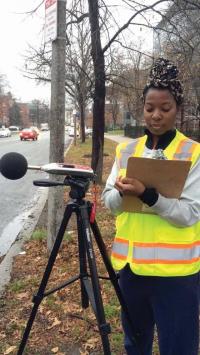December 3, 2015
 Erica Walker, a doctoral candidate with the Harvard T.H. Chan School of Public Health, measures noise outside the Longwood Medical area. Emily Dubreuil photoCertain annoyances come with living in a metropolitan city, and noise usually is at the top of the list. The steady din of loud neighbors, music, construction, sirens, and transit vehicles hits some areas harder than others, and Erica Walker, a researcher at Harvard’s T.H. Chan School of Public Health, wants to know where. So she is mapping the sounds of Boston.
Erica Walker, a doctoral candidate with the Harvard T.H. Chan School of Public Health, measures noise outside the Longwood Medical area. Emily Dubreuil photoCertain annoyances come with living in a metropolitan city, and noise usually is at the top of the list. The steady din of loud neighbors, music, construction, sirens, and transit vehicles hits some areas harder than others, and Erica Walker, a researcher at Harvard’s T.H. Chan School of Public Health, wants to know where. So she is mapping the sounds of Boston.
She plans to build a noise model based on the characteristics of Boston’s neighborhoods, including samples taken at various times at about 400 to 450 sites around the city. Dorchester is of particular interest to Walker, due to its size and high number of noise-producing elements.
“You’ve got planes, you’ve got trains, you’ve got automobiles,” Walker said to the Reporter.
A doctoral candidate in Environmental Epidemiology, the 36-year-old Walker, a Mississippi native who lives in Brookline, started thinking about the impact of community noise about six years ago, thanks to the clatter engendered by the children who were living in the apartment above her.
“They ran across the floor literally 24 hours a day, and it drove me crazy,” Walker said. Even though she loves kids, she needed to have a few moments of peace as well. After every effort to gain a reprieve failed, Walker came to the realization that this was a serious issue. This was “affecting my health,” she said.
She suspected that she did not have a unique problem.
On a whim, she posted a survey on Craigslist asking if others were consistently disturbed by footsteps and other noises in their buildings; the responses poured in. “Okay,” she said, “people really are bothered by this.”
Her work at Harvard focuses on loud community noise and how individuals respond to it. Originally, her dissertation research consisted of mapping out noise levels in communities across Boston.
Although she is recording and monitoring a variety of sounds, Walker is particularly interested in low frequency and infrasound, a sort of vibration that may not register to a human as audible noise. Her goal is to organize a series of studies based on the noise metrics she acquires. She has recently completed a study in East Boston, which is tied with Dorchester’s Savin Hill as the loudest Boston neighborhood during daytime hours, according to her measurements.
The World Health Organization has published standards for acceptable noise levels before noise is categorized as interference and annoyance and a threat of hearing loss. Many areas of Boston consistently register far above the recommended decibel level for indoor and outdoor noise levels.
The increasing number of airplane noise complaints involving Logan Airport air traffic will be the subject of a public forum in Milton tonight (Thurs., Dec. 3) that will be hosted by Congressman Stephen Lynch. Federal Aviation Administration officials have agreed to the long-sought meeting, Lynch’s office said in a statement, which will be held at Milton High School from 7 to 9 p.m.
The noise complaints have worsened after a new GPS-based navigation system that directs planes on the most efficient route was installed, Lynch’s office said. According to the statement, “the neighborhoods lying beneath those flight paths can experience extended periods of aircraft noise, raising health implications and negatively impacting the quality of life for local families.”
The quality-of-life metric is the second part of Walker’s dissertation research. As she bicycles around Boston taking noise levels, she has found that residents were often curious about her project and quick to chime in with how frustrated they are by city sounds. “If they’re upset enough to complain about it, there are probably others with the same complaint,” she said. “There’s a person behind the complaint.”
Walker is monitoring an anonymous survey being taken of attitudes and health effects as a result of exposure to community noise, which is open until April 2016 and takes just a few minutes to complete at noiseandthecity.org. Reports on the project’s progress and sound maps will also be posted at the website.
A common response to city noise complaints is a non-response. It is often taken for granted that residents sign up for the noise along with a neighborhood’s amenities. Walker hopes to personalize the effects of excess sound with case studies.
“If you don’t put a face to it, people will just be like, ‘Well, get used to it,’ ” she said.


